Following the sad passing of former British Amateur Road Race Champion and road track star Grant Thomas in The Netherlands we received many words of tribute to the man who defined ‘cool’ on a racing bike.
Mr. Paul Kilbourne has featured on our pages before, reliving his memories of his time with the now legendary ANC team.
But Paul was also close to Grant, indeed chauffeuring him to the Trico Noble team reunion in The Netherlands back in 2015.
Trico Noble was one of the top amateur teams in Europe during an era which is now known by many as a ‘Golden Age’ for Dutch Cycling.
For an Englishman to get a ride with them was quite an achievement.
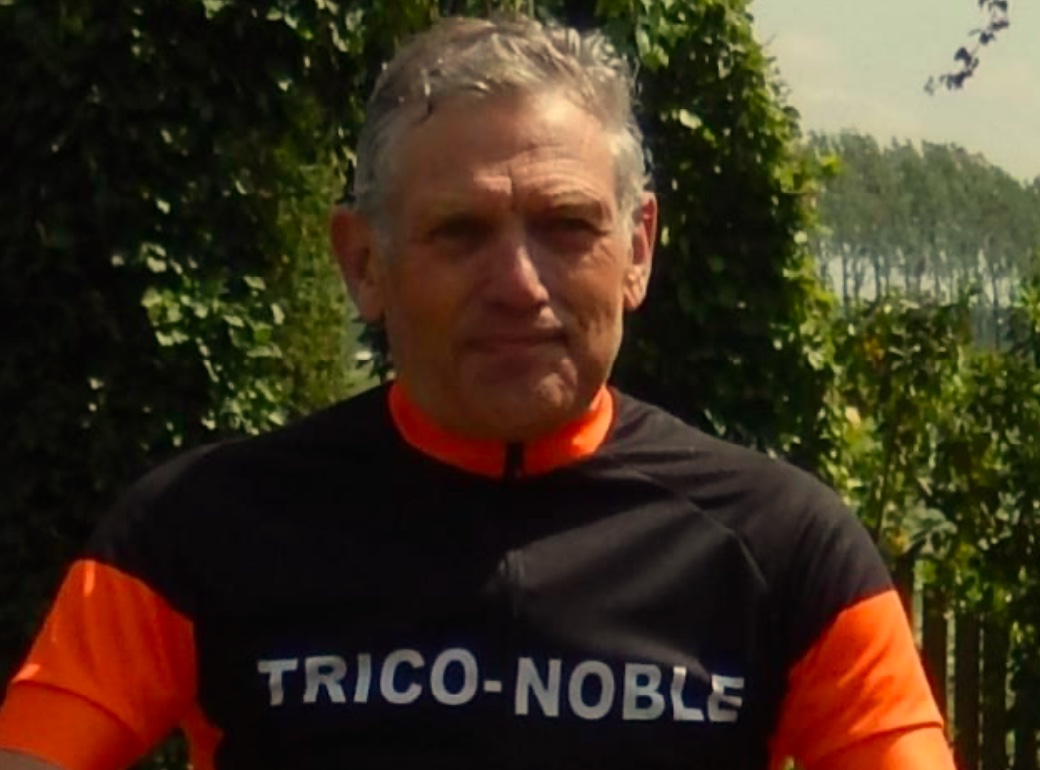
But without further verbiage from me, let’s pass the mic to Paul.
* * *
Grant Thomas, Behind the Winner’s Bouquet
By Paul Kilbourne
Some years ago, I was sitting in a friend’s front room. On the floor I noticed one of the old portable camping stoves; the sort that came disassembled in a tin. I commented on the item, to be told that my friend had several more.
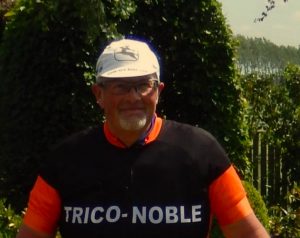
The friend was Grant Thomas.
Apparently an early Work Study film showed how, by using work study techniques, one of these could be assembled in a certain number of seconds.
Grant had studied this, and practised nightly for over a year, until he could beat the time in the film.
We’ll return to Work Study later, but this illustrates the determined, intelligent and persistent man with an enquiring mind that was Grant Thomas. He was looking for marginal gains before they were heard of, and he applied the same discipline to his cycling.
Grant was born in Aldridge (not Walsall Wood as usually listed, the family moved there a little later), an only child to parents that might be considered older than usual.
Of course, the War had affected the situation for many families.
The young Grant (Christened Grantham – he denied any connection with the town in the way that the Beckhams named their children by the way) developed two great interests, passions even.
One was playing the cornet in a local brass band; again, disciplined and regular practise were important to him, and he became very good by all accounts.
The other was cycling.
His Father was a dedicated CTC member, and took the young Grant out on rides as soon as he was old enough. Grant has shown me all his Father’s Bart’s (Bartholomew’s) dissected maps that were a prized possession of CTC riders.
He also kept, and regularly used, his Father’s map measuring wheel device. Never mind Strava, Grant preferred to map his and other’s rides the old way, and I’m sure that this brought him happy memories of being with his Father.
As has been recorded in interviews with Grant, the exciting world of cycle racing drew the teenager. His Father was highly supportive, with equipment and transport, even buying a, then, very rare and exotic Continental frame; a Bertin.
Grant started his racing career in the Walsall Roads Club, for whom he rode in the Junior National Road Championship.
It was in the Club that Grant met his long time and hugely supporting friend Dave Smith.
Bob Mansell, a hugely inspirational and influential figure in West Midland cycling, had set up the VC Central, and he recruited the clearly very talented Grant to race alongside Bob Varley, Terry Carroll and others. They were a very successful club, both in competition, and, especially, developing young riders. Bob’s Holly Lodge Criteriums, around a school; yard and playing fields, taught many future race winners their basic skills.
At the same time Grant was establishing himself as a serious talent, gaining the attention of Tom Godwin (the National Track Coach at the time) and others.
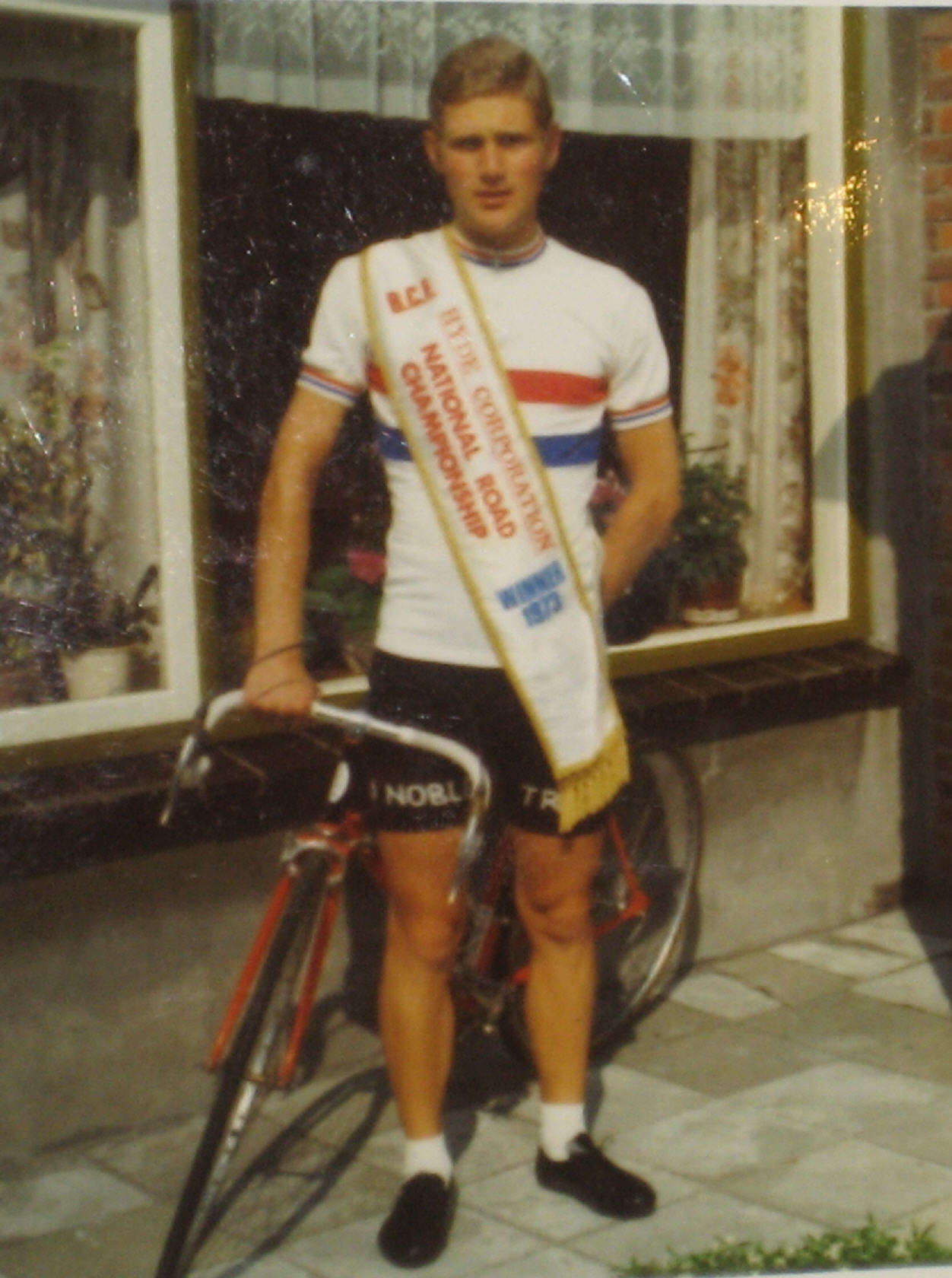
He formed friendships with many riders, but especially with Mick Bennett, another prodigious talent from the other side of Birmingham.
In 1969 Grant talked Mick into taking a trip to Limburg, where he had heard that some UK riders were based. It was a good base for racing in Belgium, Netherlands and Germany. They drove over in Grant’s Father’s A40, sleeping in the car on the way.
Turning up at a shop in Schaesburg, they asked if the owner could find them somewhere to stay. He directed them to a lovely family, the only downside being that they had to sleep top to tail in a double bed.
It was from Limburg that Grant and Mick went to Philippine, a small town just in the Netherlands but only a kilometre or so from the Belgian border. In fact, it was in Belgium until after the War, and some of them are still pretty grumpy about that. It’s famous for two things; Mussels and English speaking racing cyclists, in particular Grant.
During the 1969 racing season Philippine had become the adoptive home of Tony Milward and Alan Pettit, from Derby and Burton upon Trent respectively, due to an invitation by the mother of Tony’s then girlfriend, Marianne Moelker, to lodge with them for the remainder of the season. Tony had met Marianne at a race the previous season when he and some friends were on a racing holiday.
Tony willingly accepted the invitation, and along with his roommate Alan absconded from Mrs Deene’s guesthouse on St Michiels Laan in Gent.
Paul Moekler, an older brother of Marianne, had the idea of forming an English team for the local big two day stage race, the Omloop van Zeeuwse Vlaanderen. Word went out to other English riders, and Grant and Mick Bennett were invited along with Terry Carroll and Ian McQuaid who were in Mrs Deene’s. Riders were billeted with various families in the town. Grant and Mick went to the Roegiest family on, what is now, Braakman Weg.
After the race Grant and Mick, along with Terry and Ian, were invited to stay on in the town, in the homes that they had been billeted in.
Grant later moved from the Roegiest family’s home to their daughter’s, Cecile, and her husband, Arman Pilart’s home in the Oude Kirkstraat. Grant settled in with Arman and Cecile, who looked after him like a son.
He got a place in the local elite team, Trico Noble, which was effectively a feeder team for the Raleigh professional team and had some very big names, including Gerrie Knetemann, Cees Bal and many other quality riders.
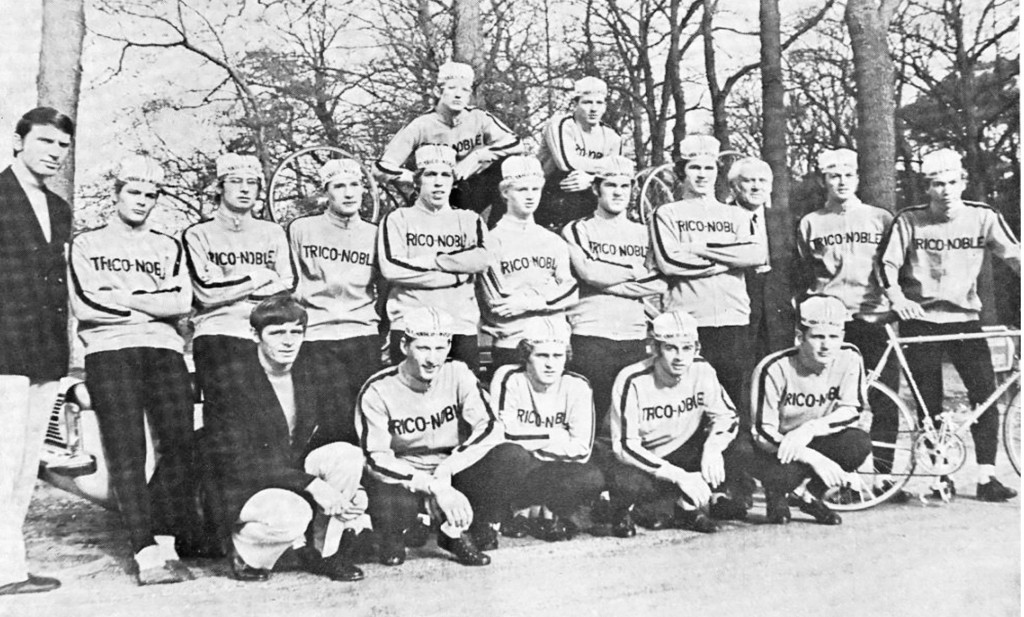
It was a well-financed team, with bikes, kit and good bonuses. Even so, Grant, ever looking for every improvement, sometimes had his own frames built and liveried up. The company was the first in the world to produce cylindrically knitted goods, such as socks, without a seam and it did very well until other producers caught up, and when Grant and I visited the old factory during the Team reunion it was a ruin.
Grant repaid the team handsomely, with numerous wins and places, including the prestigious local stage race, the Omloop van Zeeuws-Vlaanderen in 1971.
Mick, meanwhile, got a contract with Hebro Flandria, but guested for Trico Noble in the winter track races.
Whilst they were in Limburg the promoter Charles Ruys had seen Grant and Mick, and said that they had a future on the track and the Six Day scene. As a consequence they rode and won the first ever Six Day to be held on the famous Ahoy Stadium in Rotterdam (first because it preceded the professional event).
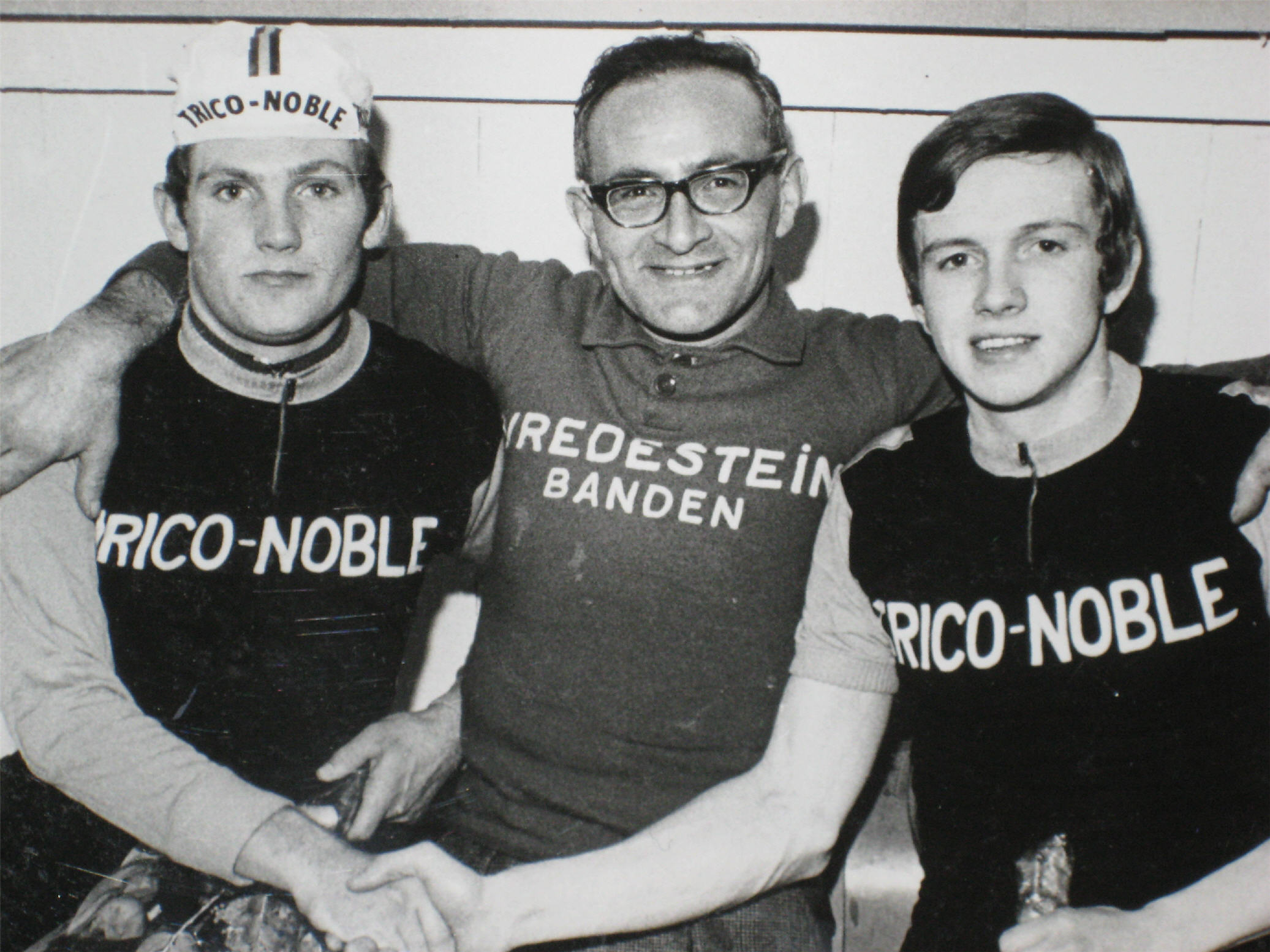
Mick stayed with Armand and Cecile through the winter; Grant and Mick totally dominated the winter track scene, including the mid-week “popularis” series at Ghent, Antwerp and Rotterdam. They developed an early type of Wattbike for winter training, again, application of science and innovation.
Although he was selected for the Milk Race, and the Worlds on several occasions, Grant felt, by 1973, that the selectors were ignoring riders based in Europe. To prove his point, he returned, with Armand, to win the National Road Championship, to the huge delight of Armand and his old mentor, Tom Godwin in particular.
Grant mainly base himself in Philippine until 1974, with a career well documented elsewhere, including his interview with VeloVeritas.
He still kept closely in touch with his “adoptive parents” though. In fact, until Cecile, then a widow, moved into care, ‘Grant’s room’ was still kept as a tribute, a shrine even, to him.
I have taken him back to Philippine twice, once when it was thought that Cecile was dangerously ill (in fact, as far as I know she is still with us), and once for the Trico Noble reunion. Others have taken him over as well, and it’s impossible to miss the reverence and pride in which Grant is held in the town.
Moving back to the UK he rode as an amateur, as well as a professional for Falcon.
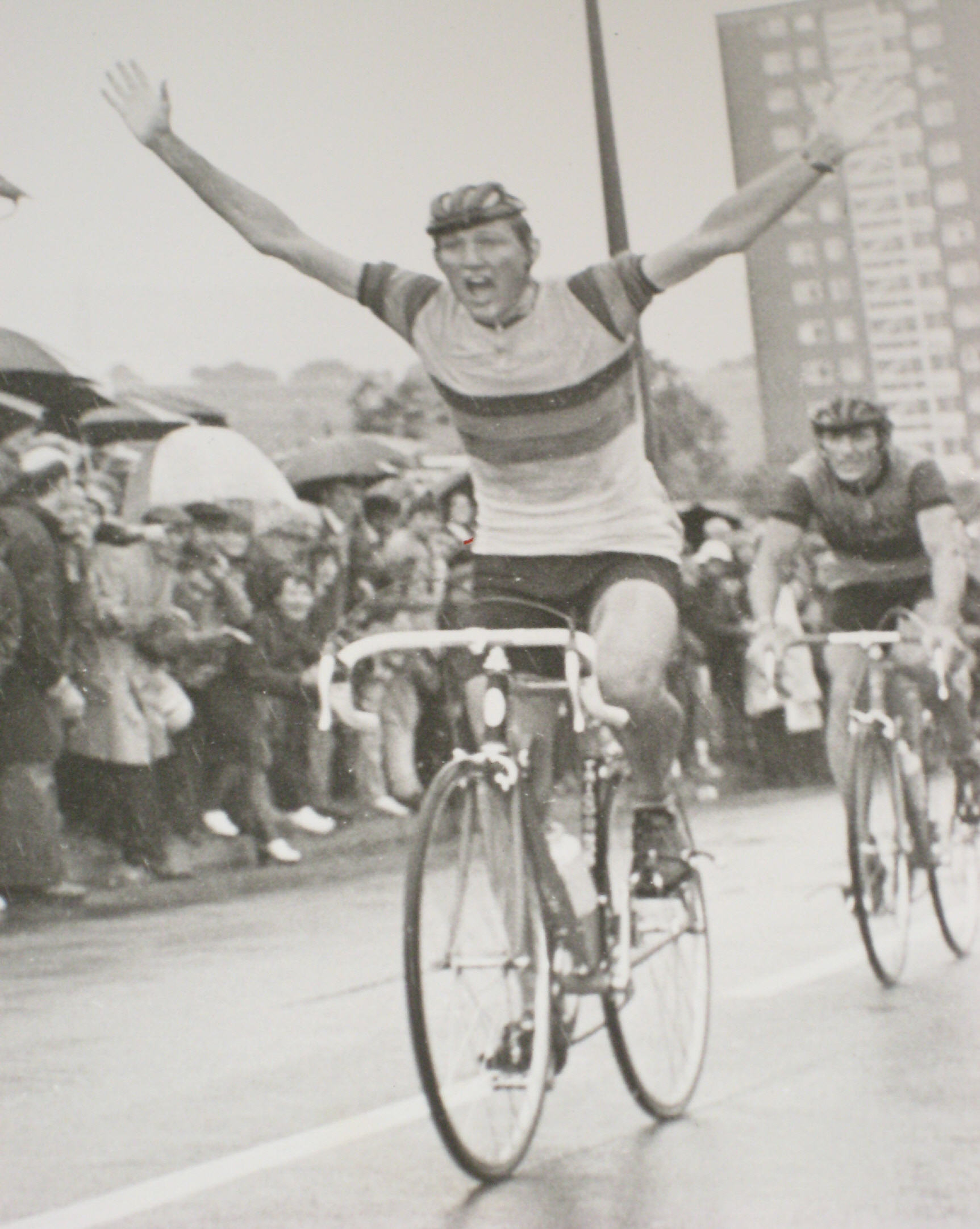
There were other aspects to Grant though, very important to him but maybe less well known. After school; he studied at the local college, gaining an HNC in Mechanical Engineering.
On retiring from serious cycling he worked for GKN automotive in Work Study. He developed a passion for Work Study, what might have then been called Time and Motion and he qualified in MTM (Time Method Measurement). He developed, and owned, a Data Base, and was actively trying to develop its potential until very recently. He loved the detail of spreadsheets.
Although he did have some contract work in the subject, but as in many things, ideas move on, and Grant was bitterly disappointed when the MTM Association, of which he was a keen member, dwindled to just being an agency-answered phone line. He was very active on LinkedIn discussing his passion for MTM principles.
His enquiring mind led to him following diverse interests, often based on his regular listening to radio programmes, including Farming Today, Women’s Hour and medical and science programmes.
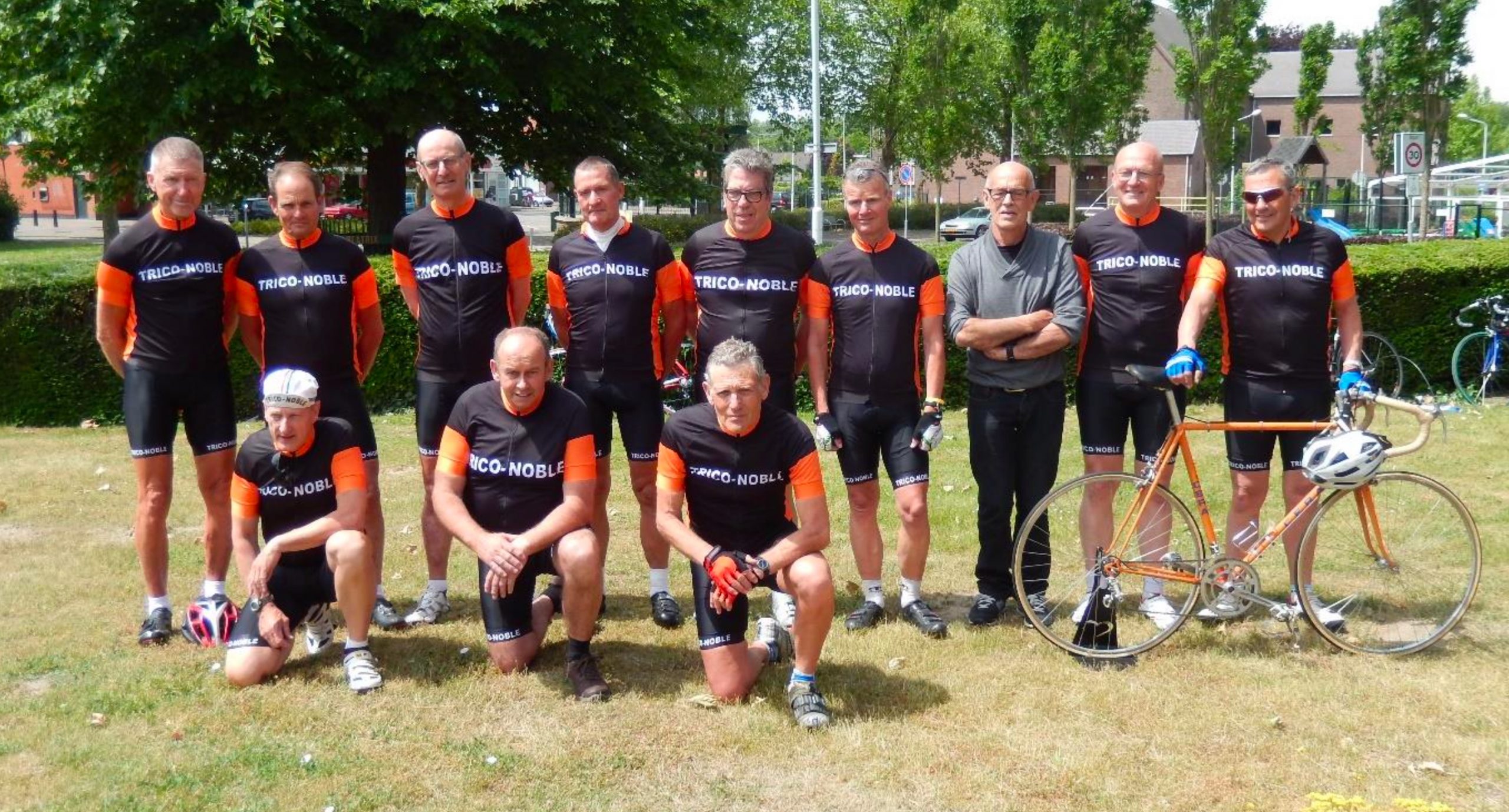
He also followed The Archers avidly. It wasn’t unusual for him to ring me about something to do with farming or food (I have a background in farming), and ask very technical questions.
He was very interested in his nutrition, and was often trying various ideas. For years he had had a “thing” about the Chorley Wood process for commercial bread production. More lately, research and reporting has shown that he was absolutely right!
Whilst gregarious, entertaining and witty company, always ready to share experience, Grant was also deeply private about personal matters.
Life wasn’t always easy for him in his later years, but he did have a lot of caring, generous and supportive friends, too numerous to mention individually but very important to him.
He kept the prostate cancer secret from virtually everyone though and his hospitalisation and subsequent demise was a great shock to us all.
He’ll be remembered for his palmarès, his consummate style on the bike, but also for just being Grant.
Everyone has at least one, probably several, ‘Grant stories’ and that’s probably how he’ll best be remembered.
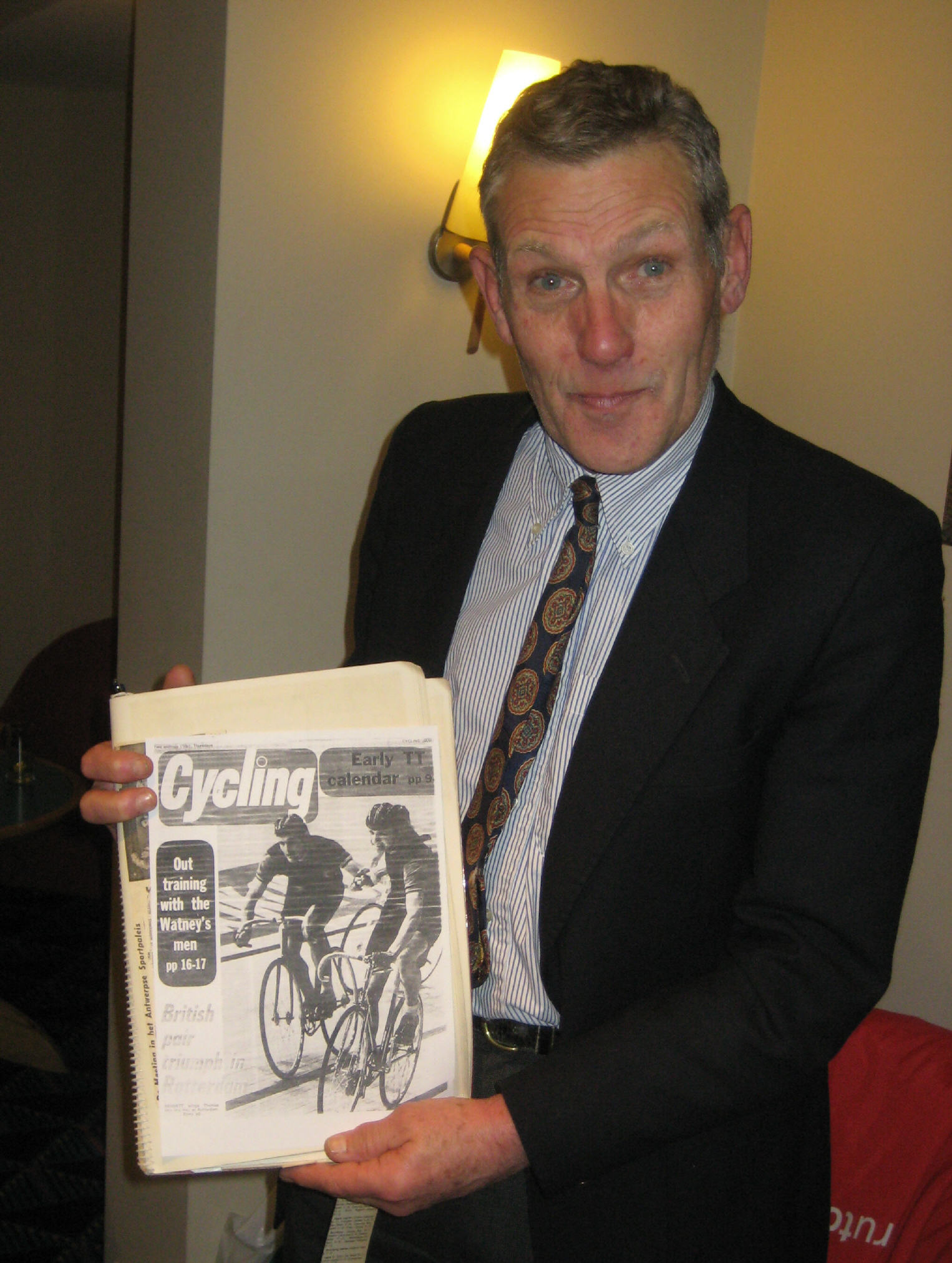
If there is an afterlife, Grant could well now be with St Peter, discussing an improved process for operating the Pearly Gates.
With grateful thanks to Derek Leeson and Mick Bennett for their input and unfailing memories.
* * *
Grant Thomas Palmarès
- 1968 2e in Atherstone Road Race, (Coventry (f)), Arley (Warwickshire), Groot-Brittannië
- 1968 6e in deel b Thornhill Criterium, (Inkberrow, Criterium, Elite zonder contract), Worcestershire, Groot- Brittannië
- 1968 3e in Keighley Festival Criterium, (Keighley, Criterium (a)), Bradford, Groot-Brittannië
- 1968 1e in John Barritt Criterium, (Keighley, Criterium (b)), Bradford, Groot-Brittannië
- 1968 4e in Rag Criterium, (Loughborough, Criterium (a)), Leicestershire), Groot-Brittannië
- 1968 1e in Southport Grand Prix – International Criterium, (Southport, Criterium), Southport (Sefton), Groot-Brittannië
- 1968 1e in Wills Criterium, (Stoneleigh, Criterium (b)), Stoneleigh (Warwickshire), Groot-Brittannië
- 1968 1e in Chequers Kermesse, (Stotfold), Stotfold (Herefordshire), Groot-Brittannië
- 1969 4e in Grand Prix of Essex – International Road Race, Halstead (Essex), Groot-Brittannië
- 1969 1e in Invicta Spring Road Race, Northampton (Northamptonshire), Groot-Brittannië
- 1969 4e in Bradford Wheelers -Triangle Road Race, Pool-in- Wharfedale (Leeds), Groot Brittannië
- 1969 1e in Ronde Anglia Road Race, Sudbury (Suffolk), Groot-Brittannië
- 1970 2e in Ronde van Achterhoek, Achterhoek (Overijssel), Nederland
- 1970 3e in Beekhuizen, Beekhuizen (Gelderland), Nederland
- 1970 10e in Nationaal Kampioenschap, Op de weg, Amateurs, Malvern Wells (Worcestershire), Groot- Brittannië
- 1970 1e in Aldersley Stadium Road Race, Wolverhampton, Groot-Brittannië
- 1970 4e in Ronde van Midden-Zeeland, Amateurs, Goes (Zeeland), Nederland
- 1970 3e in Biervliet, Amateurs, Biervliet (Zeeland), Nederland
- 1970 2e in Sluiskil, Amateurs, Sluiskil (Zeeland), Nederland
- 1970 1e in Oostburg, Amateurs, Oostburg (Zeeland), Nederland
- 1971 9e in Grand Prix of Essex – International Road Race, Halstead (Essex), Groot-Brittannië
- 1971 2e in 12e etappe Tour of Britain, (Milk Race), Brighton (Brighton and Hove), Groot-Brittannië
- 1971 1e in Koewacht, Amateurs, Koewacht (Zeeland), Nederland
- 1971 2e in Sluis, Amateurs, Sluis (Zeeland), Nederland
- 1971 2e in Cadzand, Amateurs, Cadzand (Zeeland), Nederland
- 1971 1e in 1e etappe Omloop van Zeeuws-Vlaanderen, Amateurs, Terneuzen (Zeeland), Nederland
- 1971 1e in Eindklassement Omloop van Zeeuws-Vlaanderen, Amateurs, Oostburg (Zeeland), Nederland
- 1972 3e in Berkelse Wielerdag, (Berkel, Amateurs) , Berkel (Zuid-Holland), Nederland
- 1972 2e in Graauw, Amateurs, Graauw (Zeeland), Nederland
- 1972 2e in Oostburg, Amateurs, Oostburg (Zeeland), Nederland
- 1972 3e in Schoondijke, Amateurs, Schoondijke (Zeeland), Nederland
- 1972 2e in Hoofdplaat, Amateurs, Hoofdplaat (Zeeland), Nederland
- 1972 2e in Breskens, Amateurs, Breskens (Zeeland), Nederland
- 1972 2e in Biervliet, Amateurs, Biervliet (Zeeland), Nederland
- 1972 7e in Vlissingen, Amateurs, Vlissingen (Zeeland), Nederland
- 1972 5e in Heinkenszand, Amateurs, Heinkenszand (Zeeland), Nederland
- 1972 1e in Cadzand, Amateurs, Cadzand (Zeeland), Nederland
- 1973 1e in Nationaal Kampioenschap, Op de weg, Amateurs, Hyde (Tameside), Groot-Brittannië
- 1972 2e in Kloosterzande, Amateurs, Kloosterzande (Zeeland), Nederland
- 1973 3e in Sint Maartensdijk, Amateurs, Sint Maartensdijk (Zeeland), Nederland
- 1973 3e in Boschkapelle, Hulst (Zeeland), Nederland
- 1976 3e in Tour of the Cotswolds, Shipston on Stour (Warwickshire), Groot-Brittannië



